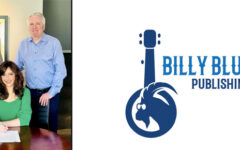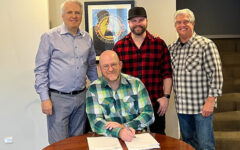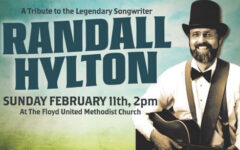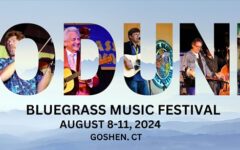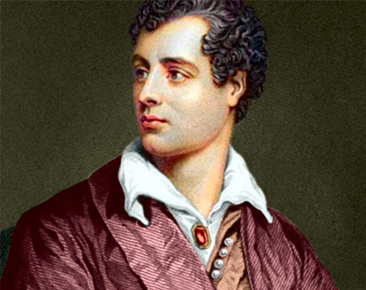
 Silence Or Tears was composed by a veteran of the North Carolina bluegrass scene, mandolin player Jerry Stuart, and the highly-esteemed bass player Tom Gray, of Country Gentlemen fame.
Silence Or Tears was composed by a veteran of the North Carolina bluegrass scene, mandolin player Jerry Stuart, and the highly-esteemed bass player Tom Gray, of Country Gentlemen fame.
However, its origins go back two centuries to the life-time of British romantic poet George Gordon Byron, 6th Baron Byron, who lived from 1788 to 1824. The writing of the song Silence Or Tears stems from a brief poem When We Two Parted, one of Byron’s more famous works.
Written in 1808, When We Two Parted is probably the most heartfelt poem written by Byron. It captures his grievous outpouring triggered by the loss of a secret love. Its simplicity seems to reach out to the reader making it more moving, even bringing a chilling poignancy, such is the sense of tragedy when this type of event is encountered. It is a timeless piece that paints innumerable images in the mind’s eye.
According to Tom Gray, Silence or Tears came together in the reverse order to the normal process.
“Ordinarily a poem is put to music. In this case the tune came first.
When I was in high school, I was a member of a bluegrass band called the Rocky Ridge Ramblers. It included Monte Monteith on guitar, Jerry Stuart on mandolin, Ron (Luke) Roswell on fiddle, Bob Lindter on banjo, and me on bass. Most of us were still in high school. We would practice several times a week. Like all bluegrass players, we liked to play fast tunes and sing slow songs in harmony.
At one rehearsal, I suggested we create a new song in which you could play it fast but sing it slow, to let the harmonies ring out. I had made up such a tune, without words and taught it to the band. We stood around playing and humming in harmony. We laughed at how ridiculous we must appear, singing a song without words.
At the next rehearsal, Jerry Stuart came in and announced he had found a poem in his English literature book with words that would fit our new tune. Sure enough, it worked. The words he gave us for the verses were the ones he adapted from Lord Byron’s poem. The words to the chorus of the song were something Jerry created himself to fit the tune we had been humming.
I brought the song to the Country Gentlemen when I joined them in 1960. We recorded it in 1961 on the album Bluegrass at Carnegie Hall on Starday Records.”
George Gordon Byron, later George Gordon Noel, 6th Baron Byron, was born January 22, 1788, in London, England.
He was a leading poet in the Romantic movement, along with William Blake, John Keats, Samuel Taylor Coleridge, Percy Bysshe Shelley and William Wordsworth.
He travelled widely throughout the Mediterranean lands and died on April 19, 1824, from fever at Missolonghi, in the Ottoman Empire (now modern day Greece).
Byron wrote When We Two Parted, a lyric poem made up of four octets about Lady Frances Wedderburn Webster, in 1813. It was first published in 1816.
When We Two Parted
George Gordon, Lord Byron.
When we two parted
In silence and tears,
Half broken-hearted
To sever for years,
Pale grew thy cheek and cold,
Colder thy kiss;
Truly that hour foretold
Sorrow to this.
The dew of the morning
Sunk chill on my brow–
It felt like the warning
Of what I feel now.
Thy vows are all broken,
And light is thy fame;
I hear thy name spoken,
And share in its shame.
They name thee before me,
A knell to mine ear;
A shrudder comes o’er me–
Why wert thou so dear?
They know not I knew thee,
Who knew thee so well–
Long, long I shall rue thee,
Too deeply to tell.
In secret we met–
In silence I grieve,
That thy heart could forget,
Thy spirit deceive
If I should meet thee
After long years,
How should I greet thee?–
With silence and tears.
Silence Or Tears
(Tom Gray, Jerry Stuart)
Verse 1:
When we two parted in silence and tears
Half broken hearted to sever for years
The love we had shared no longer could be
For now you don’t care and you’re setting me free
Chorus:
If I could meet you after long years
How would I greet you with silence or tears
Verse 2:
The dew of the morning brings chill to my brow
It felt like a warning of what I feel now
Your vows are all broken my heart feels the pain
I hear your name spoken and I share in its shame
Repeat chorus
Verse 3:
In secret we met, in silence I grieve
Your heart should forget and your spirit deceive
They know not I knew you know you too well
Long shall I miss you too deeply to tell
Repeat Chorus
Copyright reserved
Discography
- John Duffey & Charlie Waller and the Country Gentlemen Bluegrass at Carnegie Hall
- Starday Records-SLP-174, recorded in 1962, re-released in 1994.
- The Country Gentlemen Yesterday & Today Volume 3, Rebel Records, SLP-1535, released 1974.
- High Lonesome: Complete Starday Recordings – Country Gentlemen, Starday 3510-2-4
- Country Gentlemen High Lonesome (2-CD Set) Starday SD-3510, released 1998, re-released 2002.
- It has since been recorded by Bill Clifton & Red Rector, Auldridge Bennett & Gaudreau, Norman & Nancy Blake, and others.
- Red Rector and Bill Clifton – Alive – (see the Bill Clifton box set, Bear Family)
- Mike Auldridge / Jimmy Gaudreau / Richard Bennett – This Old Town
- Norman Blake – Just Gimme Somethin’ I’m Used To
The Newgrass Revival included in their repertoire for a time and their performance at the Bluegrass Renaissance, Louisville, Kentucky, September 28, 1975, was recorded.

